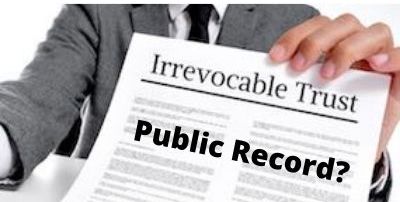
If you are asking are trusts public record, it’s either because you’re trying to find a trust or you’re trying to keep your property private.
Many people would like to maintain their privacy when purchasing property. Some also prefer privacy when disposing of or managing property. In a probate proceeding, the will becomes a public record which can be accessed by all researchers. The will then becomes unattractive, especially to people with a lot of property who wish to maintain privacy in their ownership and disposition of properties.
You might have been looking for an alternative to a will that can offer more privacy and have come across the concept of trusts. You then ask, “are trusts public record?”
As a general rule, trusts are not public record. In fact, only a few classes of people are entitled to see and read the trust document. It is generally the trustee and the trust attorney who determines who should be given a copy of the trust agreement. Usually, these classes of people entitled to see the trust agreement are the: successor trustee, beneficiaries, and personal representatives (i.e., executor or administrator). However, the IRS or state taxing authority may require the submission of the trust document when filing the estate tax return.
If the trustee or trust attorney refuses to give you a copy of the trust document and you believe you are an interested person entitled to see the document, such as a beneficiary, you can petition the court to compel the production of the trust. In New York, the court with jurisdiction under SCPA 207 (1) is the Surrogate’s Court where the assets of the trust are located, where the grantor is domiciled at the time the petition was filed, or where the trustee resides.
Trusts are not public records and do not need registration in order to be effective. Even if there is a record about ownership of trust property, there is no record of who the beneficiary of the trust property is. For example, when real property is transferred to the trust, the public record will show the new owner, the trustee, such as John Smith, as Trustee of the ABC Trust. However, the public record will not reflect who the beneficiaries are, the people who ultimately benefit from the trust.
Irrevocable trusts also have to be registered with the Internal Revenue Service because they need to get their own Employer Identification Number (EIN). Here, they also need to provide the name of their beneficiaries because when distributions are made, taxes need to be paid. However, this information is not available to the public.
An exception to this rule is a charitable trust. Trusts with a current charitable interest have to be registered with the Attorney General in New York, no later than 6 months after the charitable interest becomes current. This includes charitable lead trusts, charitable remainder trusts (when the charitable remainder interest becomes current), and trusts with wholly charitable purposes, including private foundations and public charities organized in trust form.
Generally, however, trusts are not registered in New York. If you are interested in establishing a trust, we at the Law Offices of Albert Goodwin are here for you. We have offices in New York City, Brooklyn, NY and Queens, NY. You can call us at 212-233-1233 or send us an email at [email protected].













